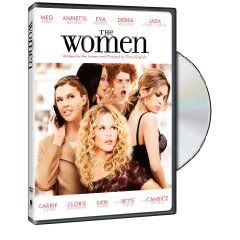"The Women" is the film "Sex and the City" wishes it was. There are some distinct similarities: both are about a group of female friends living in New York; both feature quirky main characters; both tackle relationship and fidelity issues; both look at life through a very witty filter (mostly to a fault). But "The Women" is the superior film, and that's only partly because of its much more tolerable sense of humor; the characters in this film are examined maturely, allowing us to see them as more than shallow, artificial caricatures. I actually felt something for these women. I cared about them and wondered what would happen to them. While not faithful to either George Cukor's 1939 film or the original play by Clare Boothe Luce, this new film is a delight from beginning to end, and it plays true to its title by not featuring a single male character. The plot mainly focuses on fashion designer Mary Haines (Meg Ryan), who, in addition to being fired by her own father, discovers that her well-known husband, Stephen, is having an affair with Crystal Allen (Eva Mendes), a perfume saleswoman from Saks Fifth Avenue. Standing by Mary is her best friend, magazine editor Sylvia Fowler (Annette Benning), who had already heard about the affair through a gossipy manicurist (Debi Mazar). Sylvia, as it turns out, is having problems of her own; her magazine isn't selling as well as it used to, meaning she's inches away from being fired. Desperate to keep her career alive, she sells Mary's high-profile story to a tabloid writer (a cameo by Carrie Fisher), which, as you might expect, threatens to destroy their friendship. She's no longer sure she can trust anyone, and this includes her other two friends, writer Alex Fisher (Jada Pinkett Smith), and the ever-pregnant Edie Cohen (Debra Messing). Would this story be better or worse if male characters were included? Chances are it would be worse, simply because male/female relationship stories are a dime a dozen. What makes "The Women" unique is that it forces the main character to analyze her situation from an entirely feminine perspective. A man--be it her husband, a friend, a brother, or even a stranger--is not there to influence her one way or another. Think about all the recent romantic comedies in which the male leads inevitably profess their undying love for the female co-stars: every scene like that is always so contrived, so out of touch with anything realistic or even plausible. No such scene exists in "The Women." Through the support of her friends, the wisdom of her mother (Candice Bergen), the loyalty of her housekeeper (Cloris Leachman), and an awful lot of soul searching, Mary has to determine on her own whether or not she wants to take her husband back. The question is: Does he want to be taken back? Is he still in love with her, or has he moved on? An interesting subplot focuses on the relationship between Mary and her eleven-year-old daughter, Molly (India Ennenga), who often feels unheard and misunderstood. She doesn't appreciate her mother's meaningless assertions that everything will be all right. Clearly, it won't be. She misses the love her parents shared, a love that always put an extra bounce in her mother's step. And like many young girls growing up in Western society, she believes she fat (even though she's anything but). Mary, consumed with her own problems, fails to notice the warning signs her daughter is giving off. So imagine her surprise when she learns that Molly is turning to Sylvia for advice--Sylvia, a childless woman who threw her best friend to the wolves. The confrontation between her and Mary is an interesting scene, not only because it's heartfelt and humorous at the same time, but also because of the way it's constructed; they defend themselves at the start, but by the end, one knows exactly where the other is coming from. If only all disagreements could end that way. On a women's retreat, Mary meets an agent named Leah Miller (another cameo by Better Midler). As they share a joint in their cabin, Leah reveals her secret to living life: Be selfish. Don't care about what others want. The sooner you ask, "What do I want?" the sooner you'll be content. I can't say whether or not Mary takes this idea to heart, given how she really feels about her husband. What I can say is that the women of "Sex and the City" followed it to a tee. Rarely have I seen characters so shallow, so annoying, so lacking in redeeming qualities. Thank goodness "The Women" goes in a much different direction. The pleasure of watching this movie comes from knowing that writer/director Diane English added depth to the characters. Granted, some were given more attention than others; Jada Pinkett Smith and Debra Messing weren't given much screen time, which is disappointing considering the narrative potential of their characters. This is especially true of Messing's character, the eccentric Edie, who announces early on that she'll keep getting pregnant until she has a boy (she already has three daughters). Wouldn't it be fun if she were the best friend instead of Sylvia? Or what about Smith's character, Alex, made openly gay for this modernized version? Both characters come dangerously close to being extraneous. Maybe it would have been better if the story focused on two friends instead of four. Be that as it may, "The Women" is a charming, well-acted, well-plotted film--about the most fun you'll have in a male-free environment.
